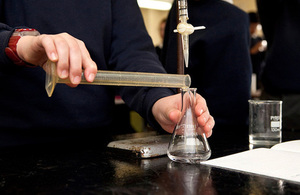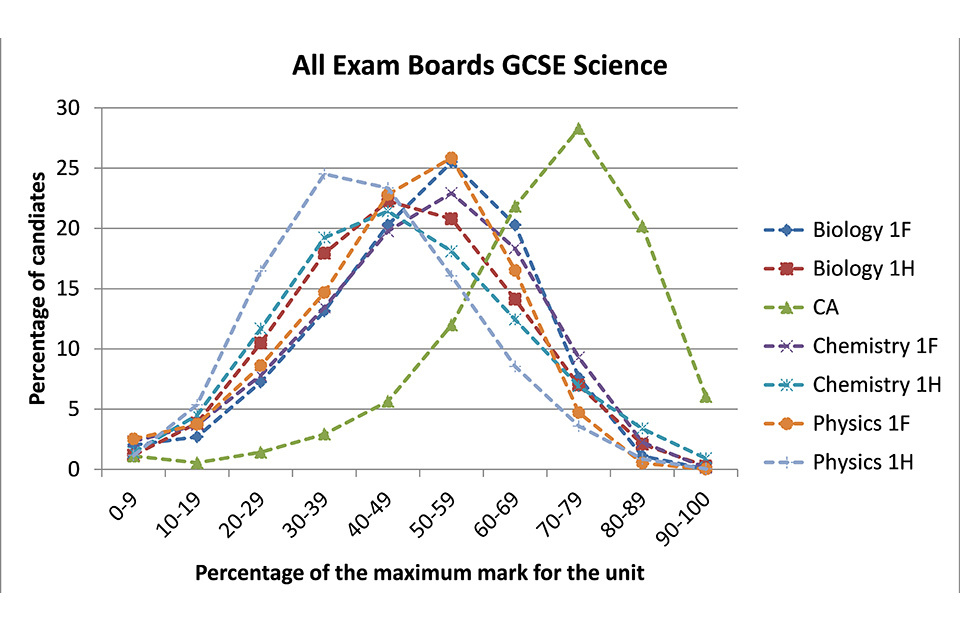Ofqual consults on changes to GCSE science practicals
Ofqual is consulting on proposals to change how GCSE science practicals are assessed.

GCSE science
We want to improve GCSE science (biology, chemistry, physics and combined science) qualifications to ensure better educational, science and particularly practical science experience for students than at present.
Science practicals are an essential part of GCSE science education and we want them to enhance scientific enquiry skills by being both memorable and engaging, not just rehearsed and repeated.
A change in approach is needed. Evidence shows that the current continuous assessments (CAs), which comprise 25% of a student’s final grade, exceed the average marks awarded to pupils in the externally assessed written exams.

Green line = continuous assessment marks. Other lines are for marks awarded in exams
Ofqual believes that the problem is that science practicals, which form the largest proportion of internal assessments, are highly predictable. They focus on a narrow range of tests which then result in high grades and less differentiation in the marks awarded between students of different ability than would be expected. Head teachers of leading independent schools have even branded them “time consuming, prescriptive and repetitive”. However, Ofqual believes that broadening the scope of these current science practicals, in a manageable and deliverable way, is next to impossible given the numbers taking the exams.
We therefore propose to assess students’ knowledge of science practicals and experimentation, rather than just their undertaking of science practicals. Research evidence reviewed by Ofqual suggests that experimentation can be assessed by well-designed, written exam questions. This would remove the need for laboratory observations.
“We have thought very carefully about protecting the curriculum,” said Glenys Stacey, Chief Regulator at Ofqual.
We want to ensure that students get a rounded experience of science. Science practicals are an essential part of that curriculum. However, as we all know, not all that is valuable in a curriculum is best assessed in an exam.
Janet Holloway, Ofqual’s Head of Reform, added:
Scientists have repeatedly told Ofqual that what is valuable about science practicals is the opportunity they give to students to practise their bench skills, to help test theoretical concepts and, crucially, to allow them to learn by failing. That isn’t best being undertaken in the current arrangments.
We believe that basing at least 15% of the new science exams on questions that directly solicit students’ first-hand knowledge of practical experiments is a better alternative. That is roughly equivalent to the amount science practicals account for in the current set up.
Moreover, under Ofqual’s proposals, exam boards will require that a minimum number of practical lessons will take place each year, that a log is kept by the school of those experiments and that the head teacher should produce them at the request of an external examiner.
Ofqual is embarking on a consultation with the aim of introducing a reformed exam in 2018. We are asking views on which is the best approach in addition to exam questions drawing on students’ science experience between direct assessment and marking contributing to the grade; assessing on a pass or fail basis or confirmation that students were able to undertake the required experiments.
“There is no one perfect solution,” said Ms Stacey.
And we are aware of the strong views of many in the profession to our proposed changes, which is why we are inviting them to contribute to our consultation.
But given that more than half a million students take the exams, their age and the impracticability of testing only the most limited of practical skills in a controlled environment, we think our initial proposals are the best way forward.
She added:
Ofqual remains open to the views of others. Whatever the final proposal looks like, it has to liberate teachers to teach the full science curriculum and underline the importance of practicals without forcing either into an unsuitable exam straitjacket. The current situation is simply insupportable.
Read the consultation: Assessing practical work in GCSE science
Press office
Press office 0300 303 3342
For enquiries from journalists only.